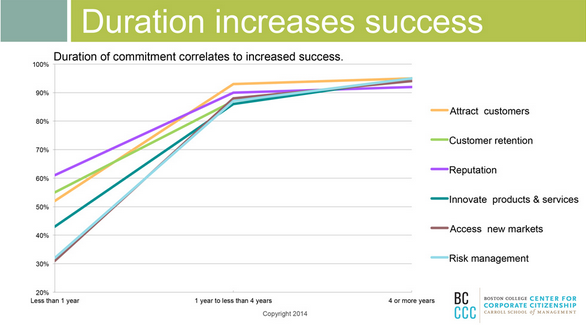Warren Buffet tells a story about Charlie Munger that illustrates a great life lesson,
“Charlie, as a very young lawyer, was probably getting $20 an hour. He thought to himself, ‘Who’s my most valuable client?’ And he decided it was himself. So he decided to sell himself an hour each day. He did it early in the morning, working on these construction projects and real estate deals. Everybody should do this, be the client, and then work for other people, too, and sell yourself an hour a day.”
At the Boston College Center for Corporate Citizenship, we are privileged to spend our days working with corporations to help them achieve their environmental, social, and governance (ESG) objectives—objectives that—if successfully achieved—will make the world a better place. This purpose informs our mission, strategies, and goals. We try to make your hours efficient by doing some of the work for you.
We know that to achieve success in today’s dynamic business environment, leaders must be sure that every person in their company is contributing to a corporate citizenship strategy that helps to deliver business value and social value. This is difficult and important work.
Futurist Alexis Madrigal said during his keynote presentation at the 2015 International Corporate Citizenship Conference: “What the future looks like has as much to do with what will endure as what will change… Part of…what creating a meaningful enterprise is—is deciding what we want to hold onto as much as what we want to change.”
The Center has been helping companies pursue that purpose since we were founded 30 years ago. To achieve it, we advise our members to determine what is most essential to business strategy and support the ESG priorities that are most central to—and most affected by—company operations. In a continually changing dynamic, this can be tremendously challenging. Making time to think about what to keep and how to change is critically important, and often shortchanged.
As part of the Carroll School of Management at Boston College, we draw insights from the top management and social science research, and have access to some of the leading experts in the field of management and corporate citizenship. We understand that doing well for the business and doing well for the world are missions that are not at cross purposes, but instead are two sides of the same coin. As importantly, we know how to achieve these objectives strategically—by approaching them with the same advanced methods and insights that any business leader would. Through our comprehensive professional development offerings, we try to offer our members an in-depth look at the tools and processes that are shaping the future of our field—and also to ground them in the fundamentals—the values and principles of corporate citizenship that remain constant.
As our field grows, and data continues to inform and refine the strategies and processes with which we work to make meaningful progress, it’s sometimes too easy to rush toward the next greatest thing—the next tool, the next program, the next partnership—to be spurred by the jargon without taking the time to evaluate and appreciate all of the work that is focused on creating the world in which we want to do business and the world in which we want to live. Taking the time to learn and think about our context and options should allow us to make decisions that we can live with for longer periods of time. This is important, as the Center’s 2014 State of Corporate Citizenship reveals that firms with longer durations of investment in ESG programs are more successful in achieving important business priorities and solving social problems that affect their operating contexts.

The (slightly) slower months of summer provide a good opportunity to take some time to reflect and decide what needs a change, and what is worth holding onto. Then you can move onto the next steps—such as finding the framework that best works for your reporting needs, how to communicate your programs more effectively, or developing your philanthropy priorities.